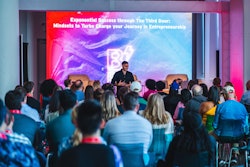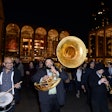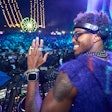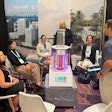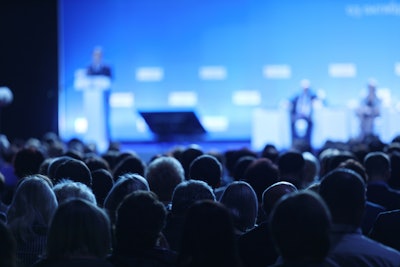
In March, full-service speakers bureau and talent booking agency All American Entertainment (AAE) surveyed over 650 event professionals to create its first-ever industry report. The 2022 Speaking Industry Benchmark Report, the findings of which were released last week, offers key insights into what matters to both speakers and event organizers now—including the topics that are resonating with audiences, the formats speakers prefer, and insights into budgets, timelines, pain points, and more.
For Jennifer Best, AAE's vice president of marketing, the goal was to better understand the clients they serve—while also making the speaker booking process more streamlined, and helping educate the industry. “With the strong rebound of the event industry this year, it seemed like the ideal time to help both parties get insight into the decision-making process so that this could be completed more efficiently for everyone involved,” she says.
Greg Friedlander, AAE’s founder and CEO, thinks this type of comprehensive report was crucial for the industry right now. “[It] really tells the story of our industry and sheds light on the entire booking process, both from an event strategist's perspective and a keynote speaker's perspective,” he notes.
BizBash studied the full report—which tapped 541 event organizers and 136 speakers and talent management companies—and pulled out some of the most interesting findings. Bonus: Keep reading to hear more insights and predictions directly from the AAE team.
1. DEI is being prioritized in 2022.
Event strategists who responded to the survey outlined some key topics they’re prioritizing in their programming this year—and over 58% said diversity, equity, and inclusion are top of mind. Others called out leadership and motivation, mental health, the future of work, and technology.
2. Budget is the most important factor in choosing a speaker right now.
When asked about the most important qualities in a keynote speaker, the survey found that the overwhelming majority of respondents—over 75%—are focused on budget first and foremost, followed by how relevant their speaking topics are and how compelling the speaker’s personal story is.
The lowest priorities when booking a speaker may be a sign of the times: Event organizers were less likely to care about location, awards and honors, or whether they come from a well-known company—perhaps reflecting our new hybrid reality, and a renewed focus on authentic connections in a post-pandemic world.
In terms of goals when choosing a speaker, most event organizers prioritize someone who can engage and educate the audience, and also help increase attendance. Another key factor? A whopping 84.1% of event organizers are looking for speakers who have experience with virtual event technology.
3. Speakers want to showcase their expertise first and foremost.
While event organizers prioritize budget, speakers tend to care whether the topic is the right fit. The largest percentage of speakers (almost 78%) were more likely to accept an offer if the topic was relevant to their expertise, while 68.4% focused on whether the event pays their ideal fee. Speakers also appreciated desirable audience demographics, and when a request was facilitated by a trusted speakers bureau.
4. Speaking fees continue to vary between virtual and in-person events.
In a bit of good news: Over 80% of respondents said their event budgets are the same or even higher than they were in 2021. When AAE asked about budget ranges for 2022, most event organizers (over 65%) typically reserved about $5,000-$20,000 for a speaker.
In terms of what speakers themselves are requesting, experience was the biggest factor: For in-person events, speakers with 10 or more years of experience earned about 54% more—for an average of around $17,300—than those with less than five years of experience. However, that gap closed a bit in the virtual space, where more experienced speakers reportedly earned just 22% more.
Another interesting fact: For virtual events, the average speaking fee in 2021 was $12,799.
5. Most speakers still prefer in-person events.
Speaking of virtual vs. IRL events: According to the report, about 24% of event organizers prefer to host the speaker in person, while around 16% like to host the speaker virtually. Others say it depends on the topic and session, and that they’re open to a mix of both in-person and virtual speakers.
In terms of what the speakers themselves want, though, the majority—over 66%—still prefer to present in person, with respondents citing the importance of reading the audience’s body language and energy. About 22% prefer a hybrid format, which they say allows for better accessibility and attendance, and just under 12% prefer virtual.
6. Yes, virtual presentations should be shorter.
In terms of how long a speaker’s presentation should last, there’s also a gap between in-person and virtual. Most event organizers said in-person speakers can present for 45 minutes to an hour, while virtual presentations should tap out at 30-45 minutes, maximum.
7. Planning timelines also vary depending on format.
For in-person appearances, more than half of event organizers surveyed said they start looking for keynote speakers two and six months before the event, due to the extra challenges and logistics involved in speaker availability and travel. That window shrunk a bit for virtual, with most speakers being booked two to four months in advance.
The speakers themselves, though, noted that they only need two to four months’ notice for in-person, and even less for virtual—but, remember that the resurgence of in-person events in 2022 means demand for speakers is sky-high, so booking early can ensure availability.
8. Contract negotiations and travel are still the biggest pain points for speakers.
AAE asked speakers to share some of the biggest challenges they’ve faced in their careers. Notably, less than 4% found the presentation itself a challenge—instead, the most popular responses revolved around travel, fee negotiations, and contract terms.
On a positive note, though, over half of surveyed speakers reported positive experiences partnering with event organizers. Of those that did report pain points, they centered around communication and timeliness, or requests to donate additional time or appearances—like meet-and-greets or social media promotion—that weren't negotiated upfront.
Click here to request a full copy of the AAE report.
Bonus: We caught up with the team at AAE to discuss the report, what they’re seeing in the speaker industry now, and their hopes for the future.
What surprised you the most about the report?
Best: "How many people in our industry were excited to be surveyed! Our initial survey request generated hundreds of responses within hours across a nice variety of industries. This reinforced our theory that there was a demand for data—both in sharing what their peers in the event industry are prioritizing, and in giving both parties in the talent booking process greater insight into what matters most."
From your perspective, what has been the biggest change in the speaker industry since the onset of the pandemic?
Friedlander: "The event industry hadn't changed in a long time. There was a tried and tested formula, and many companies were reluctant to challenge the status quo. There was always a large amount of skepticism about virtual technology and fear that virtual events (or a virtual component) would cannibalize in-person attendance. That did not turn out to be the case. The number of people participating in some of our virtual events exceeded 10 times what the event previously drew in person.
Those who embraced the unknown discovered an entirely new revenue stream and business model that has fundamentally changed how companies think about events and connecting with customers/members/employees, and the potential for them to engage a much bigger audience than would have been possible in-person. If not for the pandemic and organizations being forced to experiment, this shift would have been delayed several years—and may have never happened."
What’s the main thing you hope event professionals will take away from these findings?
Friedlander: "First and foremost, it’s my hope that our friends in the industry are able to glean actionable insights that allow them to improve their processes and be more successful. But from a macro view, what I take away from this report—and what I hope others will find too—is that the event industry is resilient. We’ve been able to hear directly from hundreds of speakers and event organizers on how they’ve adapted in the face of massive change to continue delivering unforgettable experiences to audiences."
Best: "I hope that event professionals take two things away from these findings. One, I imagine many are looking to their peers for industry trends as we come out of the pandemic, so they can make decisions about their own event priorities. Two, these findings provide greater insight into both parties in the speaker booking process. With a greater understanding of what matters to both sides, the process to book speakers becomes easier and events become even more successful."
Overall, did the report make you hopeful for the future of the industry?
Friedlander: "I’ve always believed in the speaking industry, which is what first drove me to found AAE Speakers 20 years ago—to create a partner for event organizers that can walk with them through every step of the booking process. In the past two years, our industry faced the most significant and unique challenge that I can recall in my career. Seeing so many of our clients adapt and improve in the midst of the pandemic has only strengthened my belief in our industry. This report not only allows us to quantify this phenomenon, but it also shows us how willing our clients are to share advice and support one another. And that gives me not only hope, but great confidence."
Best: "I’ve been fortunate to work in several different industries, but the event industry has quickly and solidly become my favorite because of the resilience and dedication that our clients and speakers demonstrated over the past two years. It was not an easy road for any of us, and those early days of the pandemic were also the early days of my career at AAE. The past two years, challenging as they were, gave me so much respect, compassion, and drive to want to create resources like this one for our industry. In-person events are in the midst of a massive comeback, and we’re excited about the future."





